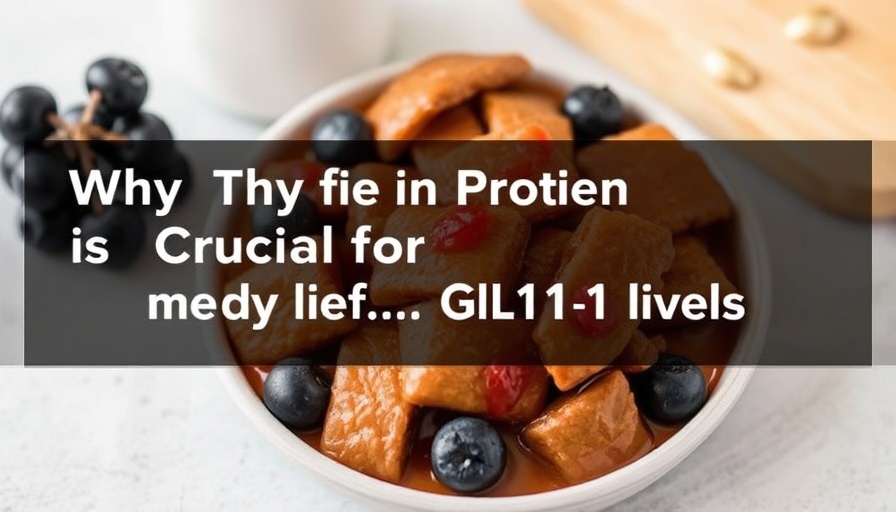
The Hidden Costs of GLP-1 Medications
As more people turn to GLP-1 medications for weight loss, it’s essential to understand their impact on overall health. While these drugs are lauded for suppressing appetite and facilitating fat loss, users may inadvertently sacrifice lean muscle mass. Research indicates that with GLP-1 therapies, up to 60% of the weight lost can come from lean body mass rather than fat, slowing metabolism and increasing the risk of nutritional deficiencies.
Why Protein is More Critical Than Ever on GLP-1 Therapy
With appetite reductions leading to decreased food intake, many GLP-1 users unknowingly lower their protein consumption, which is crucial for maintaining muscle mass. Protein isn't merely about building muscle; it plays a vital role in various bodily functions, including supporting immune health and regulating metabolism. A sufficient protein intake is a lifeline that helps preserve muscle during weight loss.
How Much Protein Do You Really Need?
The recommended protein intake varies, but during weight loss, especially on GLP-1 drugs, individuals may require between 0.55 to 0.73 grams of protein per pound of body weight. For example, a 150-pound adult might need around 83-110 grams of protein daily. This intake not only supports muscle maintenance but positively affects energy levels and metabolic health, which is crucial given that GLP-1 medications can sap energy and affect overall well-being.
Strategies to Boost Protein Intake Effectively
Many users of GLP-1 medications find practical ways to incorporate protein into their diets without feeling overwhelmed. Here are a few strategies:
- Choose nutrient-dense foods: Opt for lean meats like chicken, turkey, and fish, along with plant-based protein sources such as lentils and quinoa.
- Spread protein throughout the day: Instead of trying to consume large amounts in one meal, distribute protein intake evenly to optimize muscle repair and growth.
- Use protein supplements: Consider whey protein shakes or bars specifically designed for users on GLP-1 medications, as these can help meet protein needs without overloading the stomach.
The Role of Physical Activity
Engaging in regular physical activity, especially strength training, can significantly amplify the benefits of a high-protein diet. Exercise not only helps build and maintain muscle mass but also stimulates protein metabolism. Pairing a structured workout regime with an adequate protein intake ensures maximum muscle retention during weight loss, transforming your journey into a holistic approach to health.
Listening to Your Body
Effects like fatigue or illness during weight loss phases on GLP-1s can stem from nutrient deficiencies or muscle loss. These physical cues highlight the necessity for adequate protein and overall nutritional care. It's essential to prioritize listening to your body and readjusting dietary practices as necessary. Working with a registered dietitian can also provide personalized insight into managing protein intake effectively.
Actionable Steps to Take Now
If you’re on GLP-1 therapy or considering it, focus on enhancing protein in your diet. Start meal planning, monitor your intake using apps, and consider incorporating protein-rich snacks into your routine. Don't hesitate to reach out to a healthcare provider for tailored advice on optimizing your nutrition.
Conclusion: Embrace the Power of Protein
Ultimately, prioritizing protein while on GLP-1 medications can profoundly impact your weight loss journey and overall health. By shifting your focus back to this essential macronutrient, not only do you potentially safeguard your muscle mass, but you also enhance your daily energy levels and support your immune system. Embrace the power of protein!
 Add Row
Add Row  Add
Add 


Write A Comment